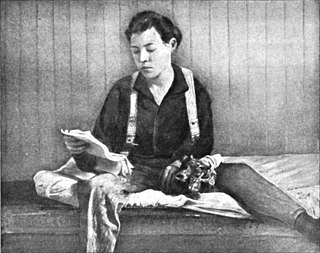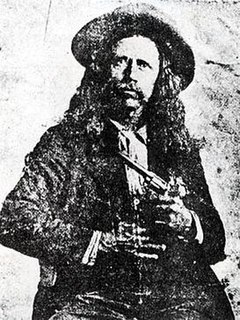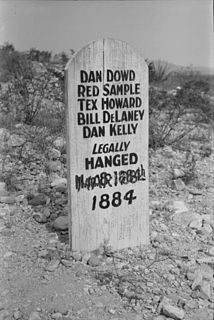Related Research Articles

The Great Train Robbery was the robbery of £2.6 million from a Royal Mail train heading from Glasgow to London on the West Coast Main Line in the early hours of 8 August 1963, at Bridego Railway Bridge, Ledburn, near Mentmore in Buckinghamshire, England.
Train robbery is a type of robbery, in which the goal is to steal money or other valuables being carried aboard trains.

The Dalton Gang was a group of outlaws in the American Old West during 1890–1892. It was also known as The Dalton Brothers because four of its members were brothers. The gang specialized in bank and train robberies. During an attempted double bank robbery in Coffeyville, Kansas in 1892, two of the brothers and two other gang members were killed; Emmett survived and was captured, tried, and convicted. He was paroled after serving 14 years in prison.

The James–Younger Gang was a notable 19th-century gang of American outlaws that revolved around Jesse James and his brother Frank James. The gang was based in the state of Missouri, the home of most of the members.

Pearl Hart was a Canadian-born outlaw of the American Old West. She committed one of the last recorded stagecoach robberies in the United States, and her crime gained notoriety primarily because of her gender. Many details of Hart's life are uncertain, with available reports being varied and often contradictory.

Thomas Edward Ketchum was an American cowboy who later became an outlaw. He was executed in 1901 for attempted train robbery.
Brian Arthur Field was an English solicitor's clerk who was one of the masterminds of the 1963 Great Train Robbery. He was the crucial link between the key informant known only as "Ulsterman" with the actual gang capable of planning and carrying out such a complex and large scale robbery. He was found guilty of Conspiracy to rob, but his conviction was later overturned on appeal. Field only served time in prison for Obstruction of Justice in relation to arranging the purchase of Leatherslade Farm, near Oakley, Buckinghamshire which was used as the gang's hideout.

Harvey Alexander Logan, also known as Kid Curry, was an American outlaw and gunman who rode with Butch Cassidy and the Sundance Kid's infamous Wild Bunch gang during the late 19th and early 20th centuries. Despite being less well-known than his fellow gang members, he has since been referred to as "the wildest of the Wild Bunch", having reputedly killed at least nine law enforcement officers in five shootings and another two men in other instances. He was involved in numerous shootouts with police and civilians and participated in several bank and train robberies with various gangs during his outlaw days.

Alphonso J. "Al" Jennings was an attorney in Oklahoma Territory who at one time robbed trains. He later became a silent film star and made many appearances in films as an actor and technical adviser.

Reuben Houston Burrow, better known as Rube Burrow, was a nationally infamous train-robber and outlaw in the Southern and Southwestern United States. During the final years of the American frontier, he became one of the most hunted in the Old West since Jesse James. From 1886 to 1890, he and his gang robbed express trains in Alabama, Arkansas, Louisiana, the Indian Territory and Texas while pursued by hundreds of lawmen throughout the southern half of the United States, including the Pinkerton National Detective Agency.
The Reno Gang, also known as the Reno Brothers Gang and The Jackson Thieves, were a group of criminals that operated in the Midwestern United States during and just after the American Civil War. Though short-lived, they carried out the first three peacetime train robberies in U.S. history. Most of the stolen money was never recovered.
John F. "Jack" Kennedy was an American outlaw, described as "the West's last notorious train robber".

Nathaniel "Texas Jack" Reed was a 19th-century American outlaw responsible for many stagecoach, bank, and train robberies throughout the American Southwest during the 1880s and '90s. He acted on his own and also led a bandit gang, operating particularly in the Rocky Mountains and Indian Territory.
The Newton Gang was an outlaw gang of the early 20th century, and the most successful train robbers and bank robbers in history. From 1919 through 1924 the gang robbed dozens of banks, claiming a total of eighty-seven banks (unconfirmed) and six trains (confirmed). According to Willis Newton, the brothers "took in more money than the Dalton Gang, Butch Cassidy's Wild Bunch and the James-Younger Gang combined." According to their own claims, they never killed anyone. It is true that they were never charged with any death or injuries associated with their robberies, although one daylight robbery in Toronto, Ontario, Canada proved nearly fatal for one bank messenger.
The El Paso and Southwestern Railroad was a short-line American railway company which operated in Arizona, New Mexico, and Texas, with line extensions across the international border into Mexico. The railroad was known as the Arizona and South Eastern Railroad from 1888 to 1902.

Thomas Marius Joseph Butler MBE was a Detective Chief Superintendent in the Metropolitan Police in London. He was most notable for leading the team of detectives that investigated the Great Train Robbery in 1963. He never married and lived with his mother. Butler was arguably the most renowned head of the Flying Squad in its history. He became known as "One Day" Tommy for the speed with which he apprehended criminals and the "Grey Fox" for his shrewdness.

Robert Rennick Dalton, better known as Bob Dalton, was an American outlaw in the American Old West. Beginning in 1891, he led the Dalton Gang, whose varying members included three of his brothers. They were known for robbing banks, stagecoaches and trains, primarily in Kansas and Oklahoma Territory, quickly attracting pursuit by lawmen.

The Bisbee massacre occurred in Bisbee, Arizona, on December 8, 1883, when six outlaws who were part of the Cochise County Cowboys robbed a general store. Believing the general store's safe contained a mining payroll of $7,000, they timed the robbery incorrectly and were only able to steal between $800 to $3,000, along with a gold watch and jewelry. During the robbery, members of the gang killed four people, including a lawman and a pregnant woman. Six men were convicted of the robbery and murders. John Heath, who was accused of organizing the robbery, was tried separately and sentenced to life in prison. The other five men were convicted of murder and sentenced to hang.

The Baxter's Curve Train Robbery, also known as the Sanderson Train Robbery, occurred in 1912 near the town of Sanderson, Texas. Ben Kilpatrick and his partner, Ole Hobek, attempted to rob a Southern Pacific express car, but they were stopped by one of their hostages, David A. Trousdale, who managed to kill both of the bandits.

William L. "Wild Bill" Carlisle was one of the last train robbers of the American West known as the "Robin Hood of the Rails" and "The White-Masked Bandit".
References
- 1 2 3 4 5 Newton, Michael. The Encyclopedia of Robberies, Heists, and Capers. New York: Facts On File Inc., 2002. (pg. 179-180) ISBN 0-8160-4488-0
- 1 2 3 "Youth's, Held In Slaying, Find Story Books Were Wrong". Pittsburgh Press . 13 December 1937.
- ↑ "Train 'Bandits' Held For Trial; Bail Denied". Sarasota Herald . 21 Dec 1937.
- ↑ "Train Robbers Sentenced; Two Youths Get 50 to 75 Years for Death in Hold-Up". New York Times . 21 Feb 1938.